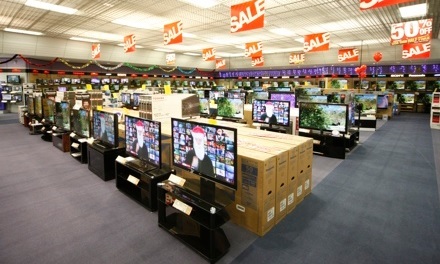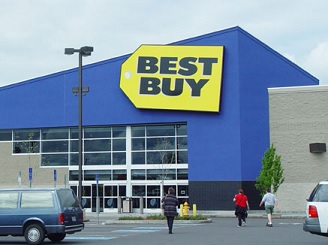What is Showrooming?
Showrooming is a relatively new term where a customer goes to store to view, or learn about a product, before ordering it online. The result is that the customer takes up staff time with either no intention of buying from the store, or wonders about getting the product cheaper online and doesn't buy on the spot.
A few years ago this was simply called "shopping around." But with the rise of the internet has come the technology to price check dozens of stores, at the click of a button.
Online discount sites have popped up that are in business to sell goods as cheaply as possible. Because these websites don't have the costs associated with having a storefront (like extra staff and all the costs that go into running a store), they can sell at prices lower than a store can.

With our smartphones on us all the time, the internet is at our finger tips. It relatively easy to be in a shop, get a model number of a product that we like, and do some research. You might check a few competing store websites, a popular online retailer, or you might use a comparison shopping engine like PriceSpy or PriceMe to sort local stores by price.
Searching online can be great way to find bargains on products. But low prices aren't helpful if you are unsure about which model is best for you? If you aren't familiar with a product, you'll often want to see it in person and test it out before buying online. In this case you need to go to a physical store, hence using a physical store as your personal "showroom".
Showrooming Scenarios
There are 2 main situations where a shopper might undertake "showrooming". One situation is opportunistic, and one is planned before hand.
1. Opportunistic Showrooming - (Last minute thought while shopping to check prices online)
Let's say you are in the market for a new TV. There are hundreds of models available and you'd like to go see as many as you can, to get a feel for what you want. You go down to your local Harvey Norman, or Noel Leeming store. You check out the TVs and have a chat with the sales staff. They sell TVs all day, and have great knowledge both of the features available, and the best model to suit your needs.

After 15 minutes of talking to a staff member and learning about the latest features, you decide on a model you like. But just before you say I'll take it, a thought enters your mind. Is this the best price? Should I look online to find a cheaper price? The problem is, you feel obligated to purchase the item right then because the nice staff member has not only helped you decide, but you have taken up their time.
With a $1200 price tag you decide that there is a lot of room for the price to come down, if only you knew what other stores were selling for. So you decide against buying, planning to go online when you get home. You awkwardly tell the attendant that you'll think about it, and slink out of the shop. The staff member curses you under their breath and you feel pretty mean for taking up their time when they could have made commission from another customer in that time.
But it's okay because your negative mood changes when you get home and find the same model $80 cheaper online. You order it on the spot and get home delivery 2 days later. While you didn't set out to waste the shops time, they techinically invested their time into you, yet you ignored that and bought from anohther retailer. This is an example of 'Opportunisitic Showrooming'
2. Pre-Meditated Showrooming - (You've found the cheapest price online, but want to see it in the flesh before clicking buy now)
So, you've done your research online. You know the best place to get the deals, but you just want to quickly compare two models before you click buy now. So you drive to your local appliance shop to view. You ignore the shop staff and go straight to the TV's you want to compare.
In about 3 minutes you know the one you want, and you leave. No one knows that you have used the store as your personal showroom, and now you are off to buy it online. Clever you! This is an example of 'Pre-Meditated Showrooming'
At least with this scenario you aren't out to take up staff time. You have done the reseach, you just want to actually see the product. No harm done. People go to stores all day long to "browse" items. There is no way staff can know whether you just strolled into the shop on a whim, or you specifically went there to see a product before buying it online.
Stores Fight Back against Showrooming
While stores might not like the showrooming that goes on, even if they could tell which customers were doing it (impossible), they can't go around kicking people out of their stores. Some stores have even considered an entry fee, or paying to try on clothes!

Some stores like Best Buy (the largest electronics retailer in the USA with 1400 stores) discovered what was happening. People were taking up their staff time deciding on a product, then going on to Amazon.com to find the lowest price from other retailers.
Best Buy were not only losing business to Amazon, but they were effectively operating a free showroom for Amazon. Showroomers were costing the company money by taking up staff time, and fewer people were actually buying making the problem a double whammy for profitablility.
So Best Buy decided to combat showrooming head on. They allowed staff to match any online price - an unheard of thing in electronics. Online stores are notorious for selling at close to cost, and doing this cheaply could make Best Buy lose a lot of money. If a customer came in quoting a cheaper online price, or found one on their smartphone while in the store, the sales staff could match it and get the sale. This meant that people had no reason to leave and buy online.
The strategy worked for Best Buy. Even though only 10% of their customers took them up on their price matching guarantee, it was enough to reverse the showrooming trend. Best Buy increased sales, and profitability massively in the year since the program has been in place.
Do you showroom?
It's human nature to want to save money where you can. No one likes knowing that they could have saved a bunch of money if they had bought elsewhere. It's also human nature to take opportunities when they present themselves. With technology allowing us to research in a few seconds it's no wonder new ways of saving money are emerging.
But is showrooming (taking up shops time) when you have no intention of giving money to, morally right? Business itself can hardly cry poor when the premise of captialism is all about, is making profit off another person. So I don't think customers are worried about taking up shops time, when they know the store buys it for a wholesale price any way.
People know about wholesale and retail, and how markups work, yet they don't complain that much about paying shop prices. It could take the same amount of effort to get a discount on your fruit as it does on a TV, but the payoff for time spent haggling over a TV is worth it. So people don't tend to gripe too much about the price differences of every day items.
Showrooming is very common in electronics/appliances, clothing and accessories and automotive industries. The higher the price of a product, the more room there is for savings, and the more people try to get a better deal.
But the fact is, with so much competition these days, most industries have pretty low markups. If a store can't keep sales and profits up, they shut down. Gone are the days when a shopkeeper handed his store down to his children. It's so easy to shop around that stores need to put a real emphasis on customer service AND price. Gone are the days of having a monopoly in your local town and charging an arm and a leg.
Showrooming could be the very thing that makes many shops shut down. Running a free showroom for online stores, and paying your staff to serve showroomers is a fast track to losing money. Times change, and technology creates new ways of doing things, and retail needs to adapt to survive. As long as you can go into a store, and walk out without purchasing anything, I think showrooming is here to stay. At least until we have instantaneous delivery systems...delivery pipes that go to your front door and allow you to return products instantly if they aren't suitable, perhaps?

On that note, an innovative company has been trying a business model that elimiates the need for you to ever go into a store, when it comes to shoes. Zappos.com is the worlds largest online shoe store, and they have a innovative way of selling shoes. You can order as many pairs as you like, and they will ship them to your house. Want to try on 20 pairs in different sizes? No problem, they'll be at your house within 48 hours.
They bring the showroom to you! They of course charge your credit card for all the pairs, but you simply try them on the send back the ones you don't want and get the refund. There is no one waiting at your door, they just ship them in a package to you. It's a great way to try shoes on at your own pace. Especially good when you aren't sure of your size. This is another clever way that online stores are taking sales away from retail. Not only do Zappos get a happy customer, but they sell more shoes as people fall in love with several pairs that are already in their living room!
Showrooming is not all bad news for stores
The number one flipside for stores that are the victims of showrooming, is the fact that customers are actually physically there in your store. People can browse online with no real intention of buying, but if a person is in your store they are a good way along the decision path.
If they weren't that interested in the product, they wouldn't have taken time out of their day to travel there.
Stores need to remember that a customer in their store is a good chance at a sale. Gone are the days of high profits. Sales are where the focus needs to be, even if the margins are razor thin.
The best way for stores to fight back is to beat the online stores at their own game. Amazon has no stores, so Best Buy has an advantage. Best Buy can capitalise on the fact that the customer is right there, and in a buying mode. If they can match the online price, they have a sale right there.
Stores need to aim to get that sale no matter what price they have to match, or miss out to cheaper online stores. The price matching offer from Best Buy is a great way to combat and eliminate the need for customers to showroom. Why buy anywhere else.
What can you do to get the best deal?
At the end of the day, stores are in business to shift product. The more they sell, the cheaper wholesale prices they can get. So they will often be happy to sell a product at close to cost to keep their sales numbers up.
Sales staff have targets they need to meet, and often have a commission component. They might need to get one more sale that week to get a bonus, so you could get a good deal if you at least ask. Show the staff member you have seen it online for 'this' price. Bring along the competitors catalogue, or bring your smartphone to show them.
Product sales are more competitive than ever so you never know. you might get the online price, with in-store service. And you can take the product on the spot. That's smart shopping!
POLL: Have you showroomed before? We have a poll going on our Facebook page. Be sure to comment yes or no!